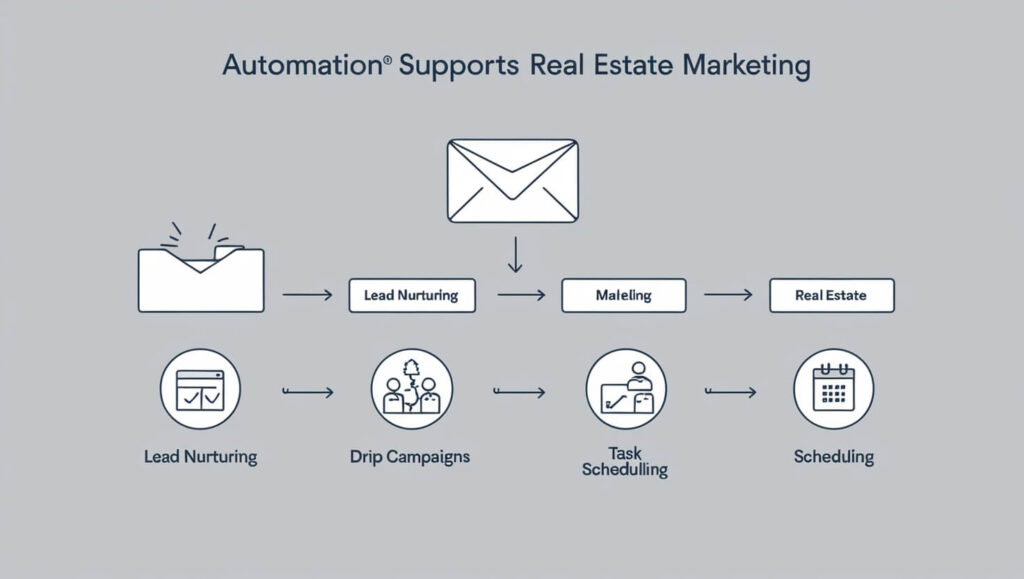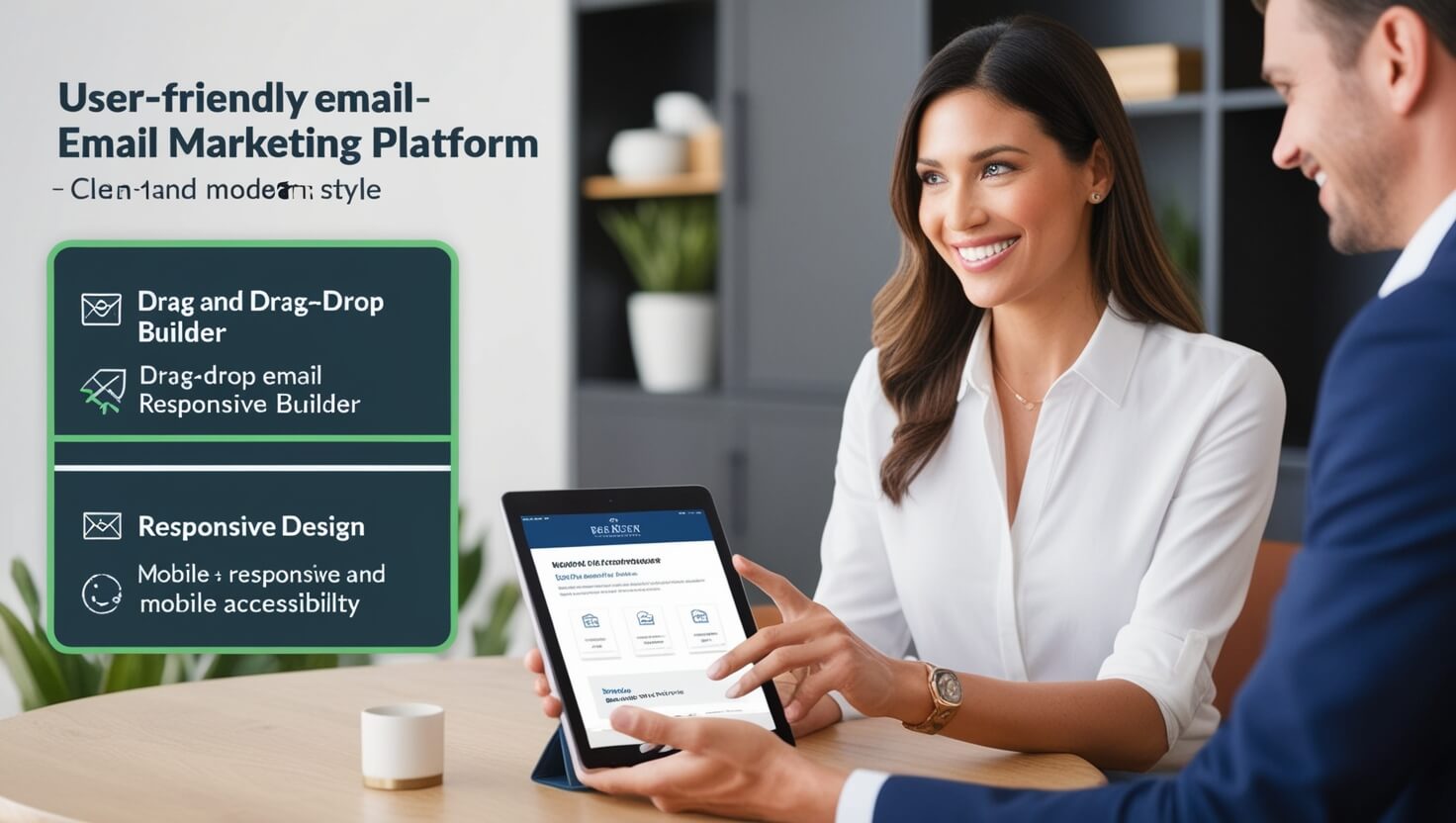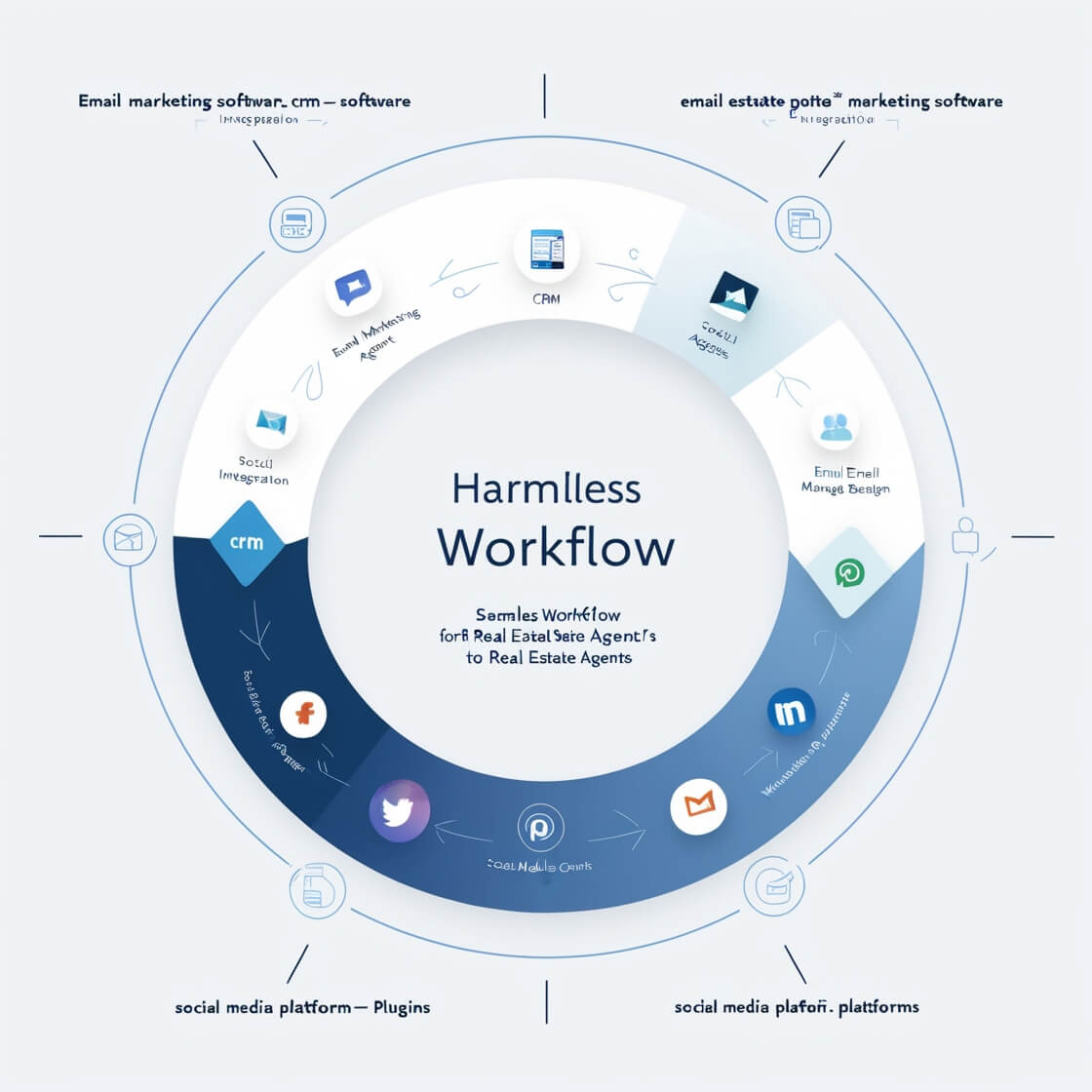The best email marketing software for real estate professionals is Constant Contact, offering industry-specific templates and powerful automation. Mailchimp is another top choice with its user-friendly interface and extensive integration options.
Selecting the right email marketing software is crucial for real estate agents aiming to nurture leads and maintain relationships with clients. A tailored solution can streamline communication, enabling agents to send property listings, market updates, and personalized messages with ease.
These tools not only save time but also enhance the effectiveness of marketing campaigns through targeted emails and analytics. Real estate professionals need software that can integrate with their customer relationship management systems, provide mobile-friendly designs, and ensure deliverability. With features such as segmentation, automated drip campaigns, and reporting, the right email marketing platform can significantly impact a real estate business’s success by driving engagement and increasing conversion rates.

Top Features To Look For
Choosing the best email marketing software is vital for real estate success. Agents need powerful features to reach clients effectively. Key elements include automation, diverse templates, and robust analytics. Let’s explore these top features that help streamline operations and maximize impact.
Automation Tools
Marketing automation for real estate agents transforms how they connect with their audience. It saves time and personalizes communication. Here’s why automation tools are a game-changer:
- Lead Nurturing: Automated emails help keep in touch with potential buyers and sellers.
- Drip Marketing Real Estate: Agents send a series of emails to leads over time, moving them down the sales funnel.
- Task Scheduling: Automate appointment reminders and follow-ups, ensuring no lead is forgotten.
Automation tools within real estate email marketing software should include:
| Feature | Benefit |
|---|---|
| Email Sequences | Send targeted messages based on client actions or time triggers. |
| Autoresponders | Instant replies to client inquiries show prompt customer service. |
| Contact Tagging | Segment contacts for personalized campaigns. |
Template Variety
A cost-effective real estate CRM provides a wealth of templates. These templates cater to various communication needs. Look for:
- Listing Announcements: Announce new properties with eye-catching layouts.
- Market Reports: Share insights with professional, data-driven designs.
- Newsletters: Keep clients informed with updates and industry news.
Template variety ensures agents send out visually appealing and content-rich emails. Templates should be:
- Mobile-friendly
- Customizable
- Branded with the agent’s logo and colors
Analytics And Reporting
Real estate email campaign optimization relies on detailed analytics. A robust system provides insights into what works and what doesn’t. Essential analytics features include:
- Open Rates: Track how many recipients are opening emails.
- Click-Through Rates: See which links and properties garner interest.
- Conversion Tracking: Measure the number of leads that take desired actions.
In-depth reporting helps agents refine their strategies. Reports should be clear and actionable. They must help agents make informed decisions on future campaigns.

Popular Software Choices
Choosing the right email marketing software is key for real estate professionals. It helps them stay in touch with clients and leads. The best tools offer easy-to-use templates, automation, and tracking. They compare email marketing platforms to find what works best for them. Here are some popular software choices known for their effectiveness in real estate email marketing services.
Mailchimp
Mailchimp is a leader in email marketing, and for good reason. It’s user-friendly and great for those starting out or with advanced needs. Real estate agents find it helpful for its range of features:
- Drag-and-drop email builder: Makes it simple to create professional emails.
- Automation: Saves time by sending emails based on user actions.
- Analytical tools: Show how campaigns perform, helping agents make informed decisions.
Mailchimp also integrates with many CRM systems, making it a top choice for commercial real estate marketing software. Below is a quick comparison table of Mailchimp’s key features.
| Feature | Description |
|---|---|
| Templates | Many choices to match any campaign style |
| Free Tier | Up to 2,000 contacts, with limited features |
| CRM Integration | Connects with popular CRMs, streamlining workflows |
Constant Contact
Constant Contact stands out for its robust email marketing solutions. It’s designed for those who need more from their real estate marketing software options. Highlights include:
- Email templates: Professionally designed and customizable.
- Contact management: Keeps client data organized and accessible.
- Tracking and reporting: Provides insights to refine strategies.
Real estate agents love Constant Contact for its ease of use and powerful features. It supports the best real estate CRM email campaigns with advanced tools.
| Feature | Description |
|---|---|
| List Building | Tools to grow and segment email lists |
| Support | Extensive customer service options |
| Engagement | Features to boost reader interaction |
Sendinblue
Sendinblue is brevo right now, this a rising star in the email marketing arena. Its focus on automation and scalability is perfect for real estate. Key features include:
- Email campaigns: Easy to design and launch.
- Transactional emails: Automates crucial client communications.
- Reporting: Offers clear metrics on campaign success.
With a strong emphasis on marketing automation, Sendinblue helps real estate professionals reach their goals faster. It’s a smart solution for those who need to manage multiple campaigns and client interactions efficiently.
| Feature | Description |
|---|---|
| Automation | Advanced automation for personalized campaigns |
| Pricing | Flexible plans based on emails sent, not contacts |
| SMS Marketing | Expands reach beyond email with SMS options |

Pricing Plans Comparison
Finding the best email marketing software for real estate can be a game-changer. It helps you connect with clients, share listings, and grow your business. But, with so many options, choosing the right one can be tough. That’s why comparing pricing plans is crucial. Let’s dive into the differences between free and paid versions, understand what truly offers value for money, and uncover any hidden costs.
Free Vs Paid
When exploring real estate email marketing services, you’ll find both free and paid options. Free versions are great for getting started. They usually allow you to send emails to a limited number of contacts. However, paid versions offer more. Let’s compare:
- Free plans often limit the number of emails you can send. They might also restrict advanced features like automation and detailed analytics.
- Paid plans unlock more power. They let you send more emails, use advanced features, and get better support.
| Feature | Free Plan | Paid Plan |
|---|---|---|
| Emails per month | 500 | Unlimited |
| Contacts | Up to 2,000 | Unlimited |
| Automation | Limited | Yes |
| Support | 24/7 Live Chat |
For cost-effective real estate CRM email campaigns, consider your needs. If your list is small, start with a free plan. As you grow, switch to a paid plan.
Value For Money
Not all paid plans offer the same value. Some might be pricey but not meet your needs. Others might be affordable marketing tools for real estate agents but offer great features. Here’s how to find value:
- Look for plans that scale with your business. They should grow as you do.
- Check if the plan includes features like email blast service for realtors and automation. These save you time.
- Compare prices. Use a marketing automation cost comparison to find the best deal.
Remember, the cheapest option isn’t always the best. Choose software that makes emailing easy and effective.
Hidden Costs
Some real estate email marketing services have costs you might not see at first. These hidden fees can add up. Here’s what to watch out for:
- Setup fees. Some services charge you just to start.
- Extra costs for adding more contacts or sending more emails.
- Fees for using certain features like custom templates or advanced analytics.
To avoid surprises, ask about all possible costs upfront. This way, you can stay within budget.
Choosing the right email marketing software is crucial for real estate agents. By understanding the differences between free and paid plans, looking for real value, and being aware of hidden costs, you can pick the best service for your needs.

User Experience And Interface
Choosing the best email marketing software for real estate is not just about sending emails. It’s about providing a seamless user experience and an intuitive interface. The right tools can make or break your email campaigns, impacting how clients engage with your brand. Let’s explore the features that enhance user experience in email marketing platforms, particularly for those in the real estate sector.
Ease Of Use
Finding a user-friendly real estate marketing platform is essential. Agents need to launch campaigns quickly and efficiently, without a steep learning curve. Here’s what to look for:
- Simple navigation menus
- Drag-and-drop email builders
- One-click campaign testing and sending
Real estate agent software programs should offer clear instructions and support. This ensures agents can focus on selling homes, not figuring out software. An ease-of-use comparison of top software might look like this:
| Software | Navigation | Email Builder | Support |
|---|---|---|---|
| Software A | Easy | Yes | 24/7 Chat |
| Software B | Moderate | Limited | Email Only |
Customization Options
Customization is key for standing out in a crowded inbox. Realtor email marketing tools should allow you to tailor every aspect of your emails. These aspects include:
- Branded templates
- Personalized content blocks
- Segmentation for targeted campaigns
With real estate software for agents, personalization goes beyond first names. It includes property recommendations and market updates relevant to each client. The ability to customize easily can be represented like this:
| Feature | Software A | Software B |
|---|---|---|
| Branded Templates | Multiple | Few |
| Content Personalization | Advanced | Basic |
Mobile Accessibility
In the fast-paced world of real estate, mobile accessibility is non-negotiable. Agents are always on the go, and the ability to manage campaigns from a phone is crucial. Look for these features in marketing tools for real estate agents:
- Responsive design for emails
- Mobile app or optimized web interface
- Real-time notifications
Effective real estate agent software programs ensure that no matter where you are, your marketing keeps running. A comparison of mobile features might look like:
| Mobile Feature | Software A | Software B |
|---|---|---|
| Responsive Emails | Yes | Yes |
| Mobile App | Yes | No |

Integration With Other Tools
Choosing the best email marketing software for real estate is not just about sending emails. It’s about creating a seamless experience across all your marketing tools. An ideal email marketing platform should blend with your other systems. This integration saves time, improves efficiency, and enhances your ability to engage with clients. Let’s explore how the right software can work in sync with other essential tools.
Crm Compatibility
The heart of real estate marketing is a robust CRM system. A good email marketing solution should offer CRM and email marketing integration. This allows for smooth data flow and personalized communication. Consider these points:
- Automatic syncing of contacts ensures your lists are always up-to-date.
- Track email interactions within the CRM for a complete view of client engagement.
- Segmentation features allow for targeted campaigns based on CRM data.
Here’s a quick comparison of how different software stacks up with CRM integration:
| Email Marketing Software | CRM Integration Level | Features |
|---|---|---|
| Software A | High | Real-time syncing, Detailed tracking |
| Software B | Medium | Batch syncing, Basic tracking |
| Software C | Low | Manual importing, No tracking |
Social Media Integration
Real estate social media automation is key for reaching a broad audience. Email marketing tools with social media features are vital. They let you share listings and content with ease. Look for these integrations:
- Direct posting to social platforms from your email campaigns.
- Track which social channels drive traffic to your email sign-up forms.
- Use social insights to tailor email content for different audiences.
An email tool that syncs with social media can elevate your multi-channel marketing for real estate. It turns followers into subscribers and vice versa.
Website Plugins
Your website is your online storefront. Thus, it must work well with your email tool. Real estate software compatibility with your website is crucial. Here’s what you should have:
- Plugins for easy sign-up form integration on your website.
- Seamless property listing updates that can be shared via email.
- Analytics plugins for tracking visitor behavior from email links.
The right plugins turn your site into a powerful part of your integrated real estate marketing tools. They help capture leads and nurture them through your email campaigns.

Case Studies And Success Stories
Email marketing software helps real estate agents reach more people. We will look at success stories. These stories show how small agencies, large brokerages, and unique campaigns found success.
Small Agency Success
Small real estate agencies have seen big results with the right email tools. One agency increased their leads by 50%. They used targeted emails and a personal touch. Let’s look at their strategy:
- Personalized Emails: They sent emails that felt personal to each reader.
- Local Market News: Their newsletters included news and trends from the local real estate market.
- Success Stories: They shared stories of happy clients who found their dream homes.
Here’s a table showing their growth:
| Month | Leads | Conversions |
|---|---|---|
| January | 100 | 10 |
| February | 150 | 15 |
This small agency proves that effective email campaigns for real estate agents can lead to big wins.
Large Brokerage Wins
Large brokerages also benefit from email marketing. One brokerage saw a 30% increase in listings. They focused on high-quality content and automation. Here’s how they did it:
- Automated Follow-ups: They set up automatic emails to keep in touch with leads.
- High-Quality Listings: Each email featured beautiful photos and detailed listings.
- Market Reports: They sent out monthly market analysis reports.
This approach helped them stand out and build trust. As a result, they saw more listings and higher engagement. Their real estate newsletter service case studies highlight the power of quality content and smart automation.
Unique Campaign Examples
Some real estate agents get creative with their email campaigns. These unique approaches can capture attention and drive action. For example:
- Virtual Open House Invites: Sending invites to virtual tours of new listings.
- Client Testimonial Videos: Sharing video stories of happy clients.
- Interactive Quizzes: Including quizzes to help clients determine what kind of home they’re looking for.
These campaigns stand out and engage potential clients in new ways. They show that thinking outside the box can lead to real estate marketing success examples. By using unique content, agents can connect with their audience on a deeper level.

Common Challenges And Solutions
In the fast-paced world of real estate, email marketing stands as a powerful tool to reach clients and nurture leads. Yet, common issues in real estate email campaigns can dampen their effectiveness. From emails that don’t reach inboxes to managing extensive contact lists and ensuring compliance, real estate professionals face unique challenges. This section delves into these hurdles and offers practical solutions to help real estate agents and marketers tap into the full potential of email marketing software.
Deliverability Issues
Real estate emails must reach the inbox to make an impact. Deliverability issues often obstruct this path. Real estate email deliverability solutions start with choosing the right software. It ensures emails are not marked as spam. Here are steps to improve deliverability:
- Use verified domains to establish trust with email servers.
- Keep your email list clean by removing inactive subscribers.
- Personalize content to engage readers and avoid spam filters.
Additionally, consider the following table that outlines key practices and their benefits:
| Best Practice | Benefit |
|---|---|
| Regular List Hygiene | Reduces bounce rates and enhances reputation. |
| Engagement Tracking | Identifies active users for targeted campaigns. |
| Content Optimization | Increases open rates with relevant subject lines and preheaders. |
List Management
Effective list management for real estate is crucial for successful email campaigns. A well-organized list ensures messages are timely and relevant. Here are techniques to manage your list effectively:
- Segment your list based on client interests and behavior.
- Regularly update contact details to maintain list accuracy.
- Provide easy unsubscribe options to respect subscriber preferences.
Real estate follow-up systems also play a role in list management. Automated follow-up emails can nurture leads and keep your brand top-of-mind. Use software that integrates CRM functionalities to track interactions and preferences, helping tailor future communications.
Compliance With Regulations
Adhering to regulations is non-negotiable in email marketing. Compliance in real estate email marketing involves understanding laws like CAN-SPAM and GDPR. Ensure your emails are compliant by:
- Getting explicit consent before sending marketing emails.
- Providing clear opt-out mechanisms in every email.
- Maintaining records of consent and user preferences.
To stay on top of these regulations, use email marketing software that offers compliance features. These systems can automate consent processes and manage opt-outs efficiently. Keeping compliant not only respects subscriber rights but also builds trust in your real estate brand.
Future Trends In Email Marketing
Real estate professionals know that staying ahead of the digital curve is key to reaching potential clients. The best email marketing software offers innovative features that cater to the dynamic needs of real estate marketing. One of the critical aspects of this is understanding the future trends in email marketing, which are rapidly evolving with new technologies. Let’s dive into some of the exciting developments that real estate agents can expect in the near future.
Ai And Personalization
AI and real estate email marketing are joining forces to revolutionize the way agents connect with their audience. This integration allows for advanced personalization, which is critical in making each client feel special. Here’s what AI brings to the table:
- Smart segmentation to tailor email campaigns based on user behavior
- Predictive analytics to anticipate client needs and interests
- Automated content creation that resonates with different market segments
Embracing AI doesn’t just mean sending emails; it’s about crafting a unique journey for each recipient. With automation in real estate email marketing, agents can ensure timely follow-ups, birthday wishes, or market updates, all personalized to the client’s profile. This leads to higher engagement and, ultimately, a greater conversion rate.
Mobile Optimization
Mobile devices are the go-to for most people reading emails today. Therefore, mobile optimization is not just a trend but a necessity. Here’s how it’s shaping the future of real estate email marketing:
- Responsive design ensuring emails look great on any device
- Fast-loading images and content for quick access on the go
- Touch-friendly buttons and links for easy navigation
Real estate agents must ensure their email campaigns are mobile-friendly to meet clients where they are. With the majority of users checking their emails on mobile devices, a seamless mobile experience can significantly increase the effectiveness of your email marketing efforts.
Interactive Content
Interactive content in real estate emails is a game-changer, making emails not just informative but engaging. This can include:
- 360-degree virtual property tours embedded in emails
- Interactive forms for instant appointment bookings
- Quizzes to help clients find their ideal property style
By incorporating interactive elements, real estate agents can provide a memorable experience that stands out. This approach not only entertains clients but also encourages them to interact more with the email content, leading to higher engagement rates and more effective campaigns.
With these emerging tools for real estate agents, the industry is set to witness a significant shift in how email marketing is strategized and executed. It’s an exciting time for real estate professionals to embrace these trends and harness the full potential of their email marketing software.
Frequently Asked Questions
What Are Top Email Marketing Tools For Realtors?
MailChimp, Constant Contact, and ActiveCampaign are highly recommended for real estate. They offer automation, customizable templates, and CRM integration, essential for managing real estate campaigns.
How Does Email Marketing Benefit Real Estate Agents?
Email marketing helps agents to nurture leads, announce new listings, and share market insights. It’s cost-effective and allows for targeted messaging, increasing the chances of closing deals through consistent engagement.
Can Email Software Integrate With Real Estate Platforms?
Yes, many email marketing platforms integrate with real estate CRMs. This integration streamlines contact management, automates follow-ups, and personalizes communication based on client activity and preferences.
What Features Should Realtors Look For In Email Software?
Realtors should seek email software with automation, segmentation capabilities, detailed analytics, and easy-to-use design tools. These features help deliver personalized content and track campaign effectiveness.
Conclusion
Choosing the right email marketing software is pivotal for real estate success. Each platform offers unique benefits tailored to industry needs. From automation to integration, the best tools enhance client engagement and boost sales. Assess your goals, and select software that aligns with your strategy for optimal results in the competitive real estate market.





